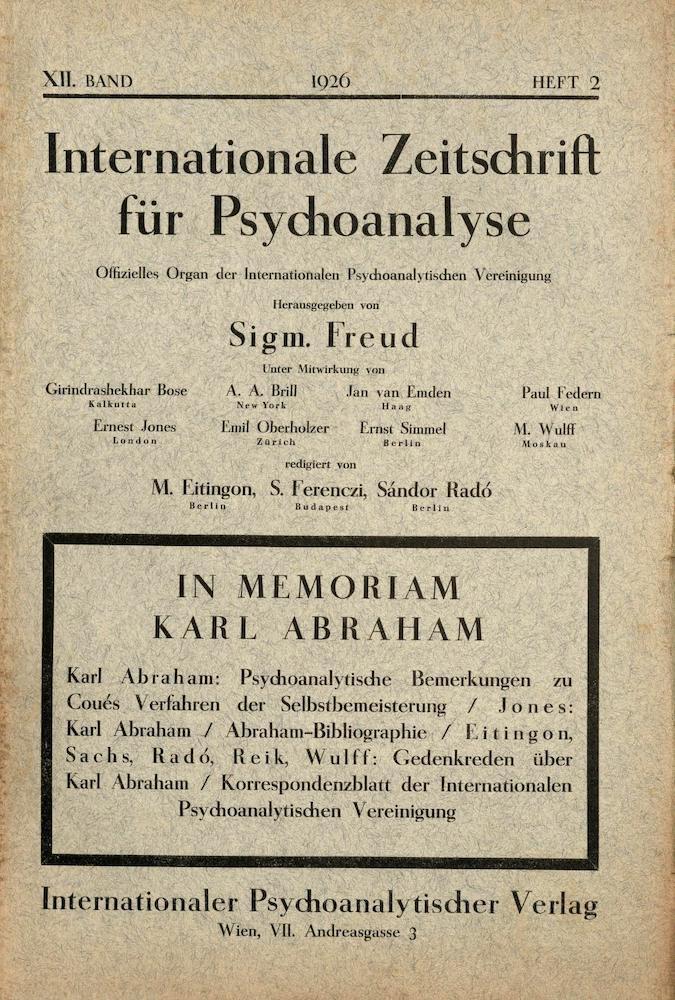

Cover and frontispiece of In Memoriam
Karl Abraham (1926; see bibliography).
Karl Abraham (1877-1925) was among the most respected first-generation followers of psychoanalysis. Born in Bremen to Jewish parents, he studied biology and medical subjects from 1896-1901 at Würzburg, Berlin and other universities, and from 1901-04 worked as an assistant at the Berlin Municipal Asylum. From 1904 Abraham's psychological and theoretical interests developed in the course of work as an assistant to Eugene Bleuler at the Burghölzli Clinic in Zürich, where he also encountered the talented and up-and-coming Carl Gustav Jung. Bleuler and Jung introduced Abraham to Freud's dynamic psychology (see Freud chronology 1907).
In 1907 Abraham introduced himself, initiating a correspondence that would grow to become central to later studies of the history and psychobiography of the psychoanalytic movement (Abraham & Freud, eds., 1965). On December 15, 1907, in response to Freud's written invitation, Abraham presented himself at Freud's Bergasse 19 apartment in Vienna, and over a number of days the two men developed an unbreakable friendship and work ethos. This coincided with Abraham's move from Zürich to a practice of his own in Berlin, where he remained until his death.
By April 1908, at the First International Psa. Congress in Salzburg, Abraham was already a major speaker, with a paper on "Some Psychosexual Differences between Hysteria and Dementia Praecox." By August of that year Abraham was forming the early Berlin Psa. Society. Whilst it had attracted some well-known psychopathologists and sexologists of the period, such as Ivan Bloch (1872-1922) and Magnus Hirschfeld (1868-1935), only the little-known and non-practicing Otto Juliusburger would remain, to be joined a few years later by Max Eitingon, who had initially preferred to remain isolated and independent upon his arrival in Berlin.
Abraham's theoretical contributions to the body of psychoanalysis began almost at once, and he valuably extended and amplified Freud's major early model of psychosexual development of the child, the well-known oral-anal-genital scheme of Freud's 1905 work, Three Essays on the Theory of Sexuality. Abraham's scheme, well-received by Freud, further divided each of Freud's initial three stages, arriving at six stages of infantile development, a forerunner of the twentieth-century's increasingly detailed approach to early human development and character-formation, to which the two daughters, Anna Freud (1895-1982) and Hilda Abraham (1906-1971), would each contribute.
With the 1912-13 Zürich dissensions of Jung and others, Abraham became a member of the Inner Committee (see Freud chronology, 1912). He performed medical service in the First World War and, along with Ernst Simmel, (1882-1947), would develop postwar treatment for sufferers of so-called "war neuroses." His student-analysands included Helene Deutsch (1884-1982), Karen Horney (1885-1952), and Melanie Klein (1882-1960).
Abraham's sudden and premature death in 1925 came as a great shock to his Berlin friends and to Freud.
Bibliography
Abraham, Karl. "On the significance of sexual trauma in childhood for the symptomatology of dementia praecox," [1907], in Karl Abraham: Selected Papers, Vol. 2. New York: Basic Books, 1955.
_____. "Dreams and myths: a study in folk-psychology," [1909], in Karl Abraham: Selected Papers, Vol. 2. New York: Basic Books, 1955.
_____. "Notes on the psychoanalytical investigation and treatment of manic-depressive insanity and related conditions" (1912), in Karl Abraham: Selected Papers, Vol. 1. New York: Basic Books, 1953.
_____. "Manifestations of the female castration-complex" (1921), in Karl Abraham: Selected Papers, Vol. 1. New York: Basic Books, 1953.
Abraham, Hilda C. and Freud, Ernst L. (eds.) A Psychoanalytic Dialogue: The Letters of Sigmund Freud and Karl Abraham, 1907-1926. New York: Basic Books, 1965.
In Memoriam Karl Abraham. In Internationale Zeitschrift für Psychoanalyse. 1926. Internet Archive. International Psychoanalytic University, Berlin. 1926. Web. 25 March 2021.
Jones, Ernest. The Life and Work of Sigmund Freud. Vol. II. London: Hogarth, 1955.
Created 25 March 2021